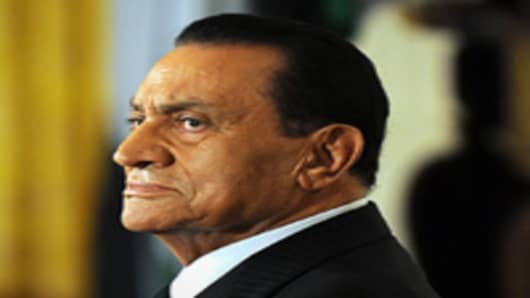Mubarak may also find that his speech undermines his position with his allies within the military and government. Both by displaying weakness and by demonstrating that he is out-of-touch with reality, he will tempt his friends to turn away from him.
There’s an even more specific reason why Mubarak’s promise won’t work as he hopes. That’s the fear that Mubarak will be replaced by his son, the former investment banker Gamal Mubarak.
Now Gamal is not all that despised—I’m told by some people who a familiar with him that he's not all that bad of a guy. He’s got a good head for economics and good relations with global leaders.
But the protesters are unlikely to passively accept anything that would put Mubarak’s son at the head of government. And despite Mubarak’s work to shore up support within the Egyptian bureaucracy and military, his support there is still quite weak. They don’t really want to risk it all—more protests, more violence, anarchy—just to see Gamal put in charge of things.
In fact, I think that the most likely reaction to Mubarak attempting to persuade the Egyptian mobs to let him stay on is a quick and efficient coup d’etat. The military and the bureaucracy will act to overthrow Mubarak in a classic version of a coup.
Here’s how Time Magazine described Edward Luttwak’s theory of coups shortly after the publication of “Coup d'Etat, A Practical Handbook.”
It involves minimal manpower and bloodshed. As in judo, the secret is to use leverage and make a state overthrow itself. Bureaucracy facilitates this by severing the loyalties that once personally bound rulers and their servants. A modern bureaucrat follows impersonal orders; if his immediate boss is subverted, the bureaucrat tends to obey orders blindly, even orders designed to topple his own government.
According to Luttwak, a coup requires three preconditions: 1) a highly centralized government with a seizable seat of power, 2) a passive people not likely to react to a takeover and 3) the assurance that no foreign power will intervene. These prerequisites usually rule out federal nations, healthy democracies and protected client states.
Very clearly the preconditions are in place in Egypt. What the plotters will likely do is obtain the cooperation of those in the military who lack personal loyalty to Mubarak but are still in the habit of following orders. Find some officers recently passed over for promotion, or a general or two who had hoped to succeed Mubarak and is frustrated at plans to put Gamal in office.
It will likely take place very quickly—less than a day. With any luck it won’t involve too much bloodshed.
_______________________________________________
Questions? Comments? Email us atNetNet@cnbc.com
Follow John on Twitter @ twitter.com/Carney
Follow NetNet on Twitter @ twitter.com/CNBCnetnet
Facebook us @ www.facebook.com/NetNetCNBC



